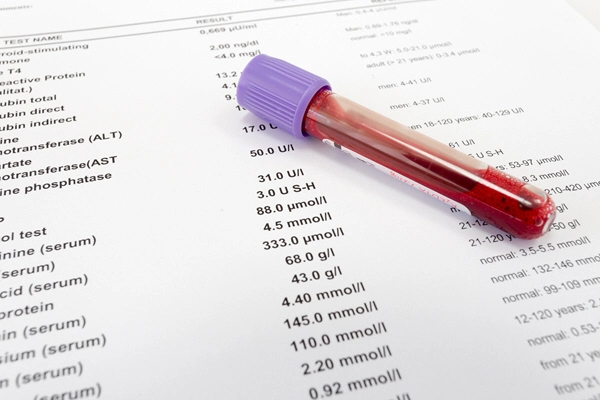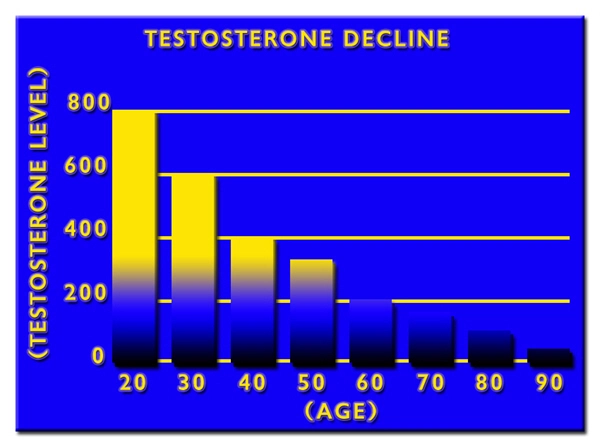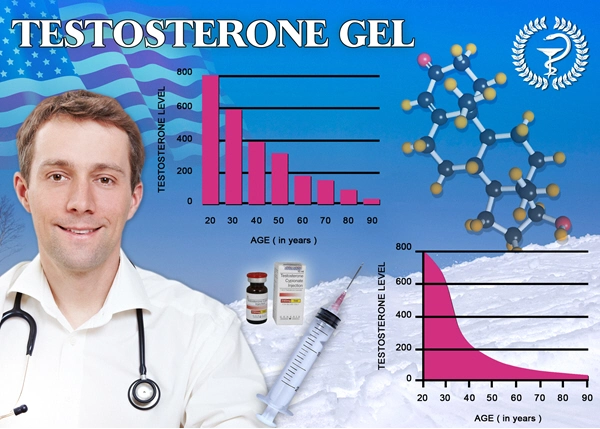Introduction
Testosterone, a pivotal hormone in men, not only governs sexual health and physical development but also plays a crucial role in immune system regulation. Recent studies have illuminated a concerning correlation between low testosterone levels and the increased risk of developing autoimmune diseases among American men. This article delves into the intricate relationship between testosterone deficiency and autoimmune disorders, offering insights into potential preventive and therapeutic strategies.
The Role of Testosterone in Immune Regulation
Testosterone is not merely a sex hormone; it is a modulator of the immune system. It influences the balance between pro-inflammatory and anti-inflammatory cytokines, which are crucial in maintaining immune homeostasis. Research indicates that testosterone can suppress the activity of immune cells, thereby potentially reducing the risk of autoimmune reactions. When testosterone levels drop, this regulatory mechanism may falter, leading to an increased susceptibility to autoimmune diseases.
Prevalence of Low Testosterone in American Men
In the United States, low testosterone, or hypogonadism, is a prevalent condition affecting a significant portion of the male population. It is estimated that approximately 40% of men over the age of 45 have low testosterone levels. Factors contributing to this include obesity, diabetes, chronic illnesses, and lifestyle choices such as poor diet and lack of exercise. The high prevalence of low testosterone underscores the importance of understanding its implications on health, particularly concerning autoimmune diseases.
Autoimmune Diseases and Low Testosterone: The Connection
Autoimmune diseases, such as rheumatoid arthritis, type 1 diabetes, and multiple sclerosis, occur when the immune system mistakenly attacks the body's own tissues. Studies have shown that men with low testosterone levels are at a higher risk of developing these conditions. For instance, a study published in the *Journal of Clinical Endocrinology & Metabolism* found that men with low testosterone had a significantly higher incidence of rheumatoid arthritis compared to those with normal levels.
The mechanism behind this association may involve the loss of testosterone's immune-modulating effects. Without adequate testosterone, the immune system may become overactive, leading to an increased risk of autoimmune responses. Additionally, low testosterone can contribute to chronic inflammation, a known risk factor for autoimmune diseases.
Clinical Implications and Management
The link between low testosterone and autoimmune diseases has significant clinical implications. Healthcare providers should consider screening men with autoimmune conditions for testosterone deficiency. Conversely, men diagnosed with low testosterone should be monitored for signs of autoimmune diseases.
Management of low testosterone in men at risk of autoimmune diseases involves a multifaceted approach. Hormone replacement therapy (HRT) can be an effective treatment for restoring testosterone levels, potentially reducing the risk of autoimmune disease development. However, HRT must be administered cautiously, as it can have side effects and may not be suitable for all patients. Lifestyle modifications, such as maintaining a healthy weight, regular exercise, and a balanced diet, can also help improve testosterone levels and overall immune health.
Future Research Directions
While the association between low testosterone and autoimmune diseases is becoming clearer, further research is needed to fully understand the underlying mechanisms and to develop targeted interventions. Longitudinal studies could provide more insights into the temporal relationship between testosterone levels and the onset of autoimmune diseases. Additionally, exploring the genetic and environmental factors that influence this relationship could lead to personalized prevention and treatment strategies.
Conclusion
The emerging evidence linking low testosterone to an increased risk of autoimmune diseases in American men highlights the importance of monitoring and managing testosterone levels. By understanding and addressing this connection, healthcare providers can better protect men from the debilitating effects of autoimmune disorders. As research progresses, it is hoped that more effective strategies will be developed to mitigate this risk, ultimately improving the health and well-being of American men.

- Environmental Toxins Linked to Declining Testosterone Levels in American Men [Last Updated On: March 4th, 2025] [Originally Added On: March 4th, 2025]
- Economic Burden of Low Testosterone on American Healthcare System [Last Updated On: March 17th, 2025] [Originally Added On: March 17th, 2025]
- Vitamin D's Role in Managing Low Testosterone in American Men: Insights and Strategies [Last Updated On: March 17th, 2025] [Originally Added On: March 17th, 2025]
- Low Testosterone in American Males: Symptoms, Causes, and Management Strategies [Last Updated On: March 18th, 2025] [Originally Added On: March 18th, 2025]
- Low Testosterone and Mood Disorders in American Men: Causes, Symptoms, and Treatments [Last Updated On: March 18th, 2025] [Originally Added On: March 18th, 2025]
- Chronic Illnesses and Their Impact on Testosterone Levels in American Males [Last Updated On: March 18th, 2025] [Originally Added On: March 18th, 2025]
- Low Testosterone's Impact on Muscle Health in American Males: Causes, Effects, and Treatments [Last Updated On: March 19th, 2025] [Originally Added On: March 19th, 2025]
- Low Testosterone in American Men: Symptoms, Diagnosis, and Treatment Options [Last Updated On: March 19th, 2025] [Originally Added On: March 19th, 2025]
- Alcohol Consumption's Impact on Testosterone Levels in American Men [Last Updated On: March 20th, 2025] [Originally Added On: March 20th, 2025]
- Low Testosterone and Diabetes in American Males: Impacts and Management Strategies [Last Updated On: March 20th, 2025] [Originally Added On: March 20th, 2025]
- Low Testosterone in Aging Men: Symptoms, Impacts, and Management Strategies [Last Updated On: March 21st, 2025] [Originally Added On: March 21st, 2025]
- Low Testosterone's Impact on Cognitive Function in American Men: Memory, Attention, and Executive Skills [Last Updated On: March 21st, 2025] [Originally Added On: March 21st, 2025]
- Smoking's Impact on Testosterone: A Critical Health Concern for American Men [Last Updated On: March 21st, 2025] [Originally Added On: March 21st, 2025]
- Low Testosterone's Impact on Skin Health in American Men: Causes and Management [Last Updated On: March 21st, 2025] [Originally Added On: March 21st, 2025]
- Shift Work's Impact on Testosterone Levels in American Men: Risks and Mitigation Strategies [Last Updated On: March 22nd, 2025] [Originally Added On: March 22nd, 2025]
- Zinc's Role in Boosting Testosterone Levels in American Men: A Comprehensive Overview [Last Updated On: March 23rd, 2025] [Originally Added On: March 23rd, 2025]
- Low Testosterone and Depression in American Males: Links, Implications, and Therapy [Last Updated On: March 23rd, 2025] [Originally Added On: March 23rd, 2025]
- Low Testosterone and Hair Loss: Impact and Management in American Males [Last Updated On: March 23rd, 2025] [Originally Added On: March 23rd, 2025]
- Boosting Testosterone in American Men Through Tailored Physical Activity [Last Updated On: March 23rd, 2025] [Originally Added On: March 23rd, 2025]
- Medications Impacting Testosterone Levels: Insights for American Men's Hormonal Health [Last Updated On: March 23rd, 2025] [Originally Added On: March 23rd, 2025]
- Weight Loss: A Key Strategy for Boosting Testosterone in American Males [Last Updated On: March 23rd, 2025] [Originally Added On: March 23rd, 2025]
- Herbal Supplements: A Natural Approach to Treating Low Testosterone in American Men [Last Updated On: March 23rd, 2025] [Originally Added On: March 23rd, 2025]
- Low Testosterone Linked to Osteoporosis Risk in American Men: Prevention and Treatment Insights [Last Updated On: March 24th, 2025] [Originally Added On: March 24th, 2025]
- Low Testosterone in American Males: Impact on Libido and Treatment Options [Last Updated On: March 24th, 2025] [Originally Added On: March 24th, 2025]
- Dietary Strategies to Boost Testosterone in American Men: Key Nutrients and Foods [Last Updated On: March 24th, 2025] [Originally Added On: March 24th, 2025]
- Genetic Factors in Low Testosterone Among American Males: Research and Implications [Last Updated On: March 24th, 2025] [Originally Added On: March 24th, 2025]
- Nutritional Deficiencies and Testosterone: Insights for American Males [Last Updated On: March 24th, 2025] [Originally Added On: March 24th, 2025]
- Low Testosterone and Prostate Health: Understanding Risks and Management Strategies [Last Updated On: March 24th, 2025] [Originally Added On: March 24th, 2025]
- Environmental Estrogens: Impact on Testosterone Levels in American Males [Last Updated On: March 25th, 2025] [Originally Added On: March 25th, 2025]
- Low Testosterone and Metabolic Syndrome: Impacts and Interventions in American Men [Last Updated On: March 25th, 2025] [Originally Added On: March 25th, 2025]
- Low Testosterone: Symptoms, Diagnosis, and Impact on Men's Quality of Life [Last Updated On: March 25th, 2025] [Originally Added On: March 25th, 2025]
- Low Testosterone: Impacts and Strategies for Managing Body Composition in American Males [Last Updated On: March 25th, 2025] [Originally Added On: March 25th, 2025]
- Low Testosterone and Anemia: Exploring the Link and Treatment in American Men [Last Updated On: March 25th, 2025] [Originally Added On: March 25th, 2025]
- Low Testosterone's Impact on Emotional Health in American Men: Insights and Solutions [Last Updated On: March 25th, 2025] [Originally Added On: March 25th, 2025]
- Chronic Inflammation's Impact on Testosterone Levels in American Males [Last Updated On: March 26th, 2025] [Originally Added On: March 26th, 2025]
- Chronic Stress Impact on Testosterone Levels in American Men: Management Strategies [Last Updated On: March 26th, 2025] [Originally Added On: March 26th, 2025]
- Low Testosterone's Impact on Immune Function in American Males: Insights and Interventions [Last Updated On: March 26th, 2025] [Originally Added On: March 26th, 2025]
- Low Testosterone and Thyroid Disorders: Exploring the Link in American Men [Last Updated On: March 26th, 2025] [Originally Added On: March 26th, 2025]
- Liver Health's Crucial Role in Managing Testosterone Levels in American Males [Last Updated On: March 27th, 2025] [Originally Added On: March 27th, 2025]
- Low Testosterone Linked to Insulin Resistance in American Men: Impacts and Strategies [Last Updated On: March 27th, 2025] [Originally Added On: March 27th, 2025]
- Low Testosterone Linked to Increased Heart Disease Risk in American Men [Last Updated On: March 27th, 2025] [Originally Added On: March 27th, 2025]
- Low Testosterone and Skin Health: Impacts and Management in American Men [Last Updated On: March 27th, 2025] [Originally Added On: March 27th, 2025]
- Hormonal Imbalance and Low Testosterone in American Males: Causes, Symptoms, and Treatments [Last Updated On: March 27th, 2025] [Originally Added On: March 27th, 2025]
- Sleep Apnea's Impact on Testosterone Levels in American Males: Causes and Solutions [Last Updated On: March 27th, 2025] [Originally Added On: March 27th, 2025]
- Chronic Pain's Impact on Testosterone Levels in American Males: A Comprehensive Analysis [Last Updated On: March 28th, 2025] [Originally Added On: March 28th, 2025]
- Managing Low Testosterone in Aging Men: Symptoms, Diagnosis, and Treatment Options [Last Updated On: March 28th, 2025] [Originally Added On: March 28th, 2025]
- Dental Health Impacts Testosterone Levels in American Males: Insights and Recommendations [Last Updated On: March 28th, 2025] [Originally Added On: March 28th, 2025]
- Low Testosterone Linked to Neurological Risks in American Men: Implications and Interventions [Last Updated On: March 28th, 2025] [Originally Added On: March 28th, 2025]
- Respiratory Health's Impact on Testosterone Levels in American Males: COPD and Asthma Effects [Last Updated On: March 29th, 2025] [Originally Added On: March 29th, 2025]
- Low Testosterone Linked to Increased Kidney Disease Risk in American Men [Last Updated On: March 30th, 2025] [Originally Added On: March 30th, 2025]
- Gut Health and Testosterone: A Vital Connection for American Men's Wellness [Last Updated On: March 30th, 2025] [Originally Added On: March 30th, 2025]
- Low Testosterone's Impact on Musculoskeletal Health in American Men: Risks and Interventions [Last Updated On: April 1st, 2025] [Originally Added On: April 1st, 2025]
- ENT Health's Crucial Role in Optimizing Testosterone Levels in American Males [Last Updated On: April 1st, 2025] [Originally Added On: April 1st, 2025]
- Low Testosterone Linked to Increased Eye Disorder Risk in American Men [Last Updated On: April 2nd, 2025] [Originally Added On: April 2nd, 2025]
- Reproductive Health's Impact on Testosterone Levels in American Men [Last Updated On: April 4th, 2025] [Originally Added On: April 4th, 2025]
- Low Testosterone and Hematological Risks in American Men: Insights and Management [Last Updated On: April 7th, 2025] [Originally Added On: April 7th, 2025]
- Understanding Low Testosterone: Causes, Diagnosis, and Management Strategies [Last Updated On: April 7th, 2025] [Originally Added On: April 7th, 2025]
- Low Testosterone's Impact on Urological Health in American Men: Risks and Management [Last Updated On: April 7th, 2025] [Originally Added On: April 7th, 2025]
- Low Testosterone Levels Linked to Higher Infection Risk in American Men [Last Updated On: April 8th, 2025] [Originally Added On: April 8th, 2025]
- Low Testosterone Linked to Psychiatric Disorders in American Men: Implications and Management [Last Updated On: April 9th, 2025] [Originally Added On: April 9th, 2025]
- Immune System's Role in Low Testosterone Among American Males: A Holistic View [Last Updated On: April 10th, 2025] [Originally Added On: April 10th, 2025]
- Managing Rheumatological Health to Address Low Testosterone in American Males [Last Updated On: April 10th, 2025] [Originally Added On: April 10th, 2025]
- Cancer's Impact on Testosterone Levels in American Men: Causes, Effects, and Management [Last Updated On: April 10th, 2025] [Originally Added On: April 10th, 2025]
- Testosterone Levels and Wound Healing in American Males: Impacts and Implications [Last Updated On: April 12th, 2025] [Originally Added On: April 12th, 2025]
- Trauma's Impact on Testosterone Levels in American Males: Physiological and Psychological Insights [Last Updated On: April 13th, 2025] [Originally Added On: April 13th, 2025]
- Low Testosterone's Impact on Surgical Outcomes in American Men: Risks and Recommendations [Last Updated On: April 13th, 2025] [Originally Added On: April 13th, 2025]
- Low Testosterone and Vascular Health: Impacts and Management in American Men [Last Updated On: April 13th, 2025] [Originally Added On: April 13th, 2025]
- Managing Low Testosterone: The Crucial Role of Anesthetic Health in American Males [Last Updated On: April 15th, 2025] [Originally Added On: April 15th, 2025]
- Low Testosterone Linked to Increased Allergic Reactions in American Men: Health Implications [Last Updated On: April 15th, 2025] [Originally Added On: April 15th, 2025]
- Neonatal Health's Impact on Adult Testosterone Levels in American Males [Last Updated On: April 16th, 2025] [Originally Added On: April 16th, 2025]
- Low Testosterone in Men Linked to Increased Pediatric Disorder Risk in Offspring [Last Updated On: April 17th, 2025] [Originally Added On: April 17th, 2025]
- Low Testosterone in American Men Linked to Congenital Disorders: Implications and Management [Last Updated On: April 18th, 2025] [Originally Added On: April 18th, 2025]
- Prenatal Health's Impact on Testosterone Levels in American Males [Last Updated On: April 19th, 2025] [Originally Added On: April 19th, 2025]
- Low Testosterone and Genetic Disorders: Risks and Implications for American Men [Last Updated On: April 19th, 2025] [Originally Added On: April 19th, 2025]
- Testosterone's Role in Male Health: Development, Genetics, and Lifestyle Impacts [Last Updated On: April 19th, 2025] [Originally Added On: April 19th, 2025]
- Occupational Health's Impact on Testosterone Levels in American Males [Last Updated On: April 20th, 2025] [Originally Added On: April 20th, 2025]
- Low Testosterone's Impact on Geriatric Health in American Men: Detection and Management [Last Updated On: April 20th, 2025] [Originally Added On: April 20th, 2025]



List of USA state clinics - click a flag below for blood testing clinics.
Word Count: 608



















































